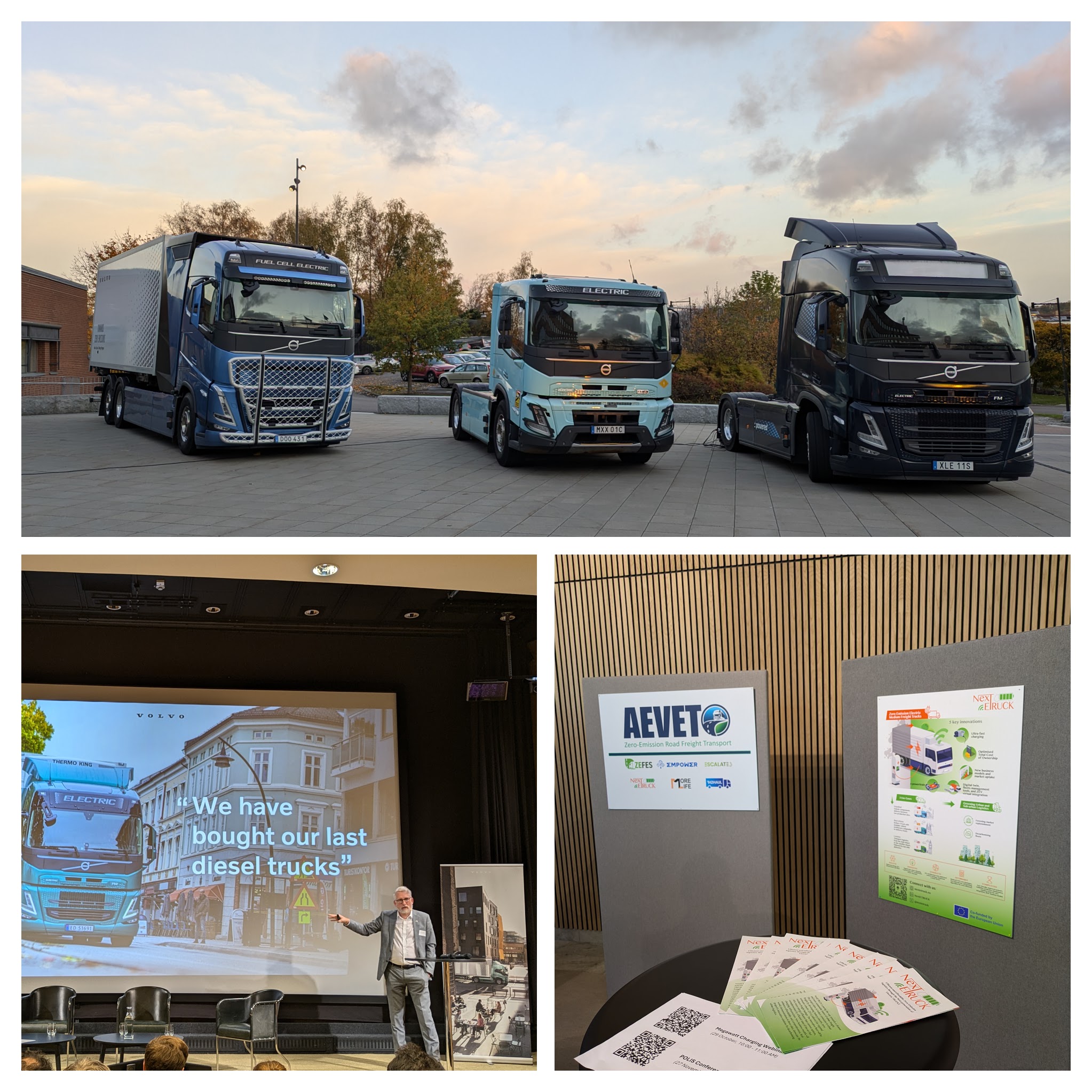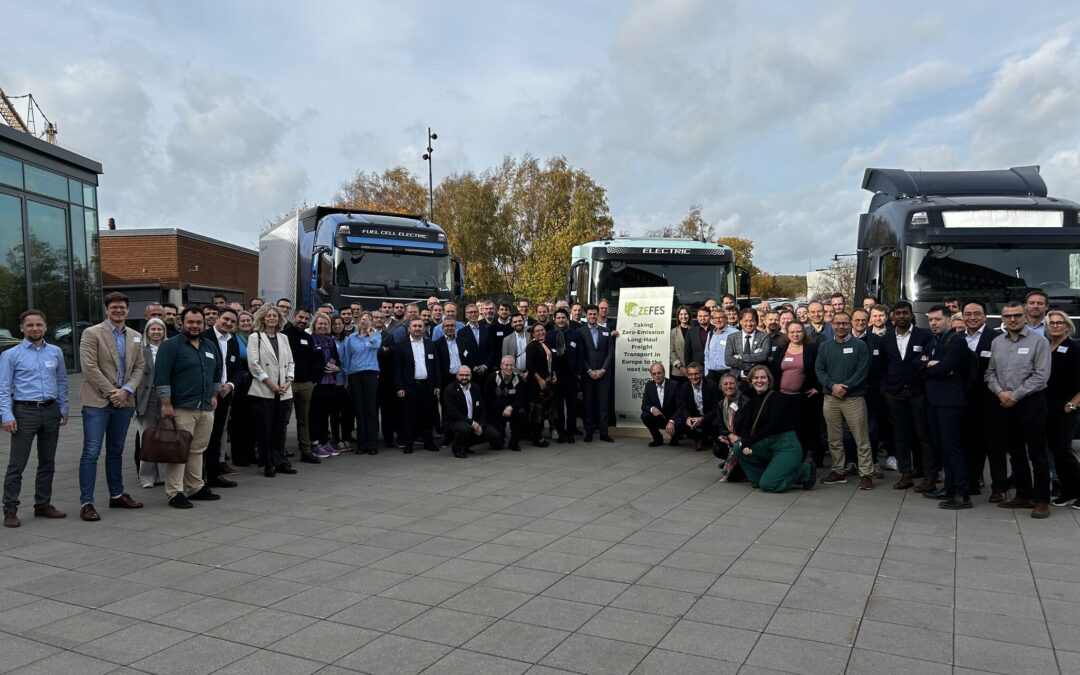The project of NextETRUCK was invited by its AEVETO cluster sister project of ZEFES to their annual Symposium, which took place on 23 October 2024 at the headquarters of Volvo Trucks in the Swedish city of Gothenburg. Our consortium member POLIS Network engaged with the partners from the ZEFES project, local stakeholders, OEMs and experts as part of the World Café in the afternoon of the symposium.
The full day of keynotes and panel discussions highlighted significant challenges related to the decarbonisation of the road freight transport sector. An enthusiastic atmosphere and a positive outlook related to ZEFES and the other AEVETO cluster projects should be considered as a strong assess to tackle the existing hurdles related to battery technology, digital solutions, refueling and recharging infrastructure, as well as the competitiveness of battery electric HDVs in comparison to traditional internal combustion engine vehicles (ICEs).
The positive spirit of the event was already spread with the welcome words by Volvo Trucks as the host of the symposium, who emphasised their ambitious decarbonisation targets linked to the Paris agreement, which requires a net-zero supply chain of Volvo by 2040, as it takes approximately ten years for freight forwarders to overhaul their fleet.
What are the challenges on the long and winding road towards zero-emission long-haul freight?
A simple glance into the symposium agenda depicts the three main fields of action: weights & dimensions, business models and charging solutions.
The current regulations for weights and dimensions do not sufficiently address the future challenges of zero-emission HDVs, as these 44t-trucks are often not allowed to operate in cross-border routes. Just twelve EU countries are currently allowing European Modular System (EMS) trucks to operate in a cross-border setting. Therefore, large battery-electric HDVs, which will be tested as part of the ZEFES project, currently cannot operate in a frictionless manner.
Further bottlenecks do currently exist related to megawatt charging (MCS) systems, which are tested in both ZEFES and NextETRUCK. The size of such fast-charging solutions could halve the number of truck parking spaces at truck parking areas along highways.
Business aspects and total cost of ownership is the third obstacle of a larger rollout, even though local Swedish studies that were presented in the ZEFES Symposium show that high utilisation rates of charging stations are possible without creating significant queues at the charging locations. The utilisation rate of chargers is an essential KPI, as it indicated the occupancy of each charger and therefore its revenue potential. Such studies suggest that HDV fast charging can be a profitable business, as long-haul trucks are expected to charge during off-peak hours to either utilise driver rest times or profit from reduced prices per kWh. Therefore, it is expected that the utilisation rate of charging stations is high, as trucks are likely charge throughout the day and widen the charging peak.
Whereas all three panel debates and related presentations have raised several questions and significant challenges, stakeholders are optimistic that the pilot results of ZEFES and the AEVETO cluster projects will foster the uptake of zero-emission freight vehicles.

What are the aims of the ZEFES project?
Besides the cross-border aspects of the long-haul pilots, ZEFES aims to achieve various other goals, such as improved refueling- and recharging stations which are being built for the project, as well as the demonstration of an interoperable megawatt charging system (MCS) and digital twinning solutions. The tests of infrastructure, vehicles and other solutions are divided into 16 use cases supported by OEMs, researchers and freight forwarders from across Europe.
Overall the main objective of the project is to create a pathway for long-haul BEVs and FCEVs to become more affordable and reliable, more energy efficient, with a longer range per single charge and reduced charging times able to meet the user’s needs.
What will happen next in NextETRUCK and the AEVETO cluster?
Internal meetings of the AEVETO cluster partners are taking place in the upcoming weeks to discuss potential dissemination opportunities, as several events and milestones were identified as worth cooperating.
Furthermore, NextETRUCK will have a shared stand with ESCALATE at the ALICE Logistics Innovation Summit, which will take place on 6-7 November 2024 in Brussels, Belgium. Additionally, our project will share its latest insights as part of the POLIS Conference on 27-28 November 2024 in Karlsruhe, Germany. The session of NextETRUCK will take place on Wednesday, 27th November from 16:45 to 18:15 and is called “Big is Beautiful: electrifying buses and trucks”.
We also invite you to follow our AEVETO partner ZEFES on social media (Twitter & LinkedIn), if you want to learn more.

